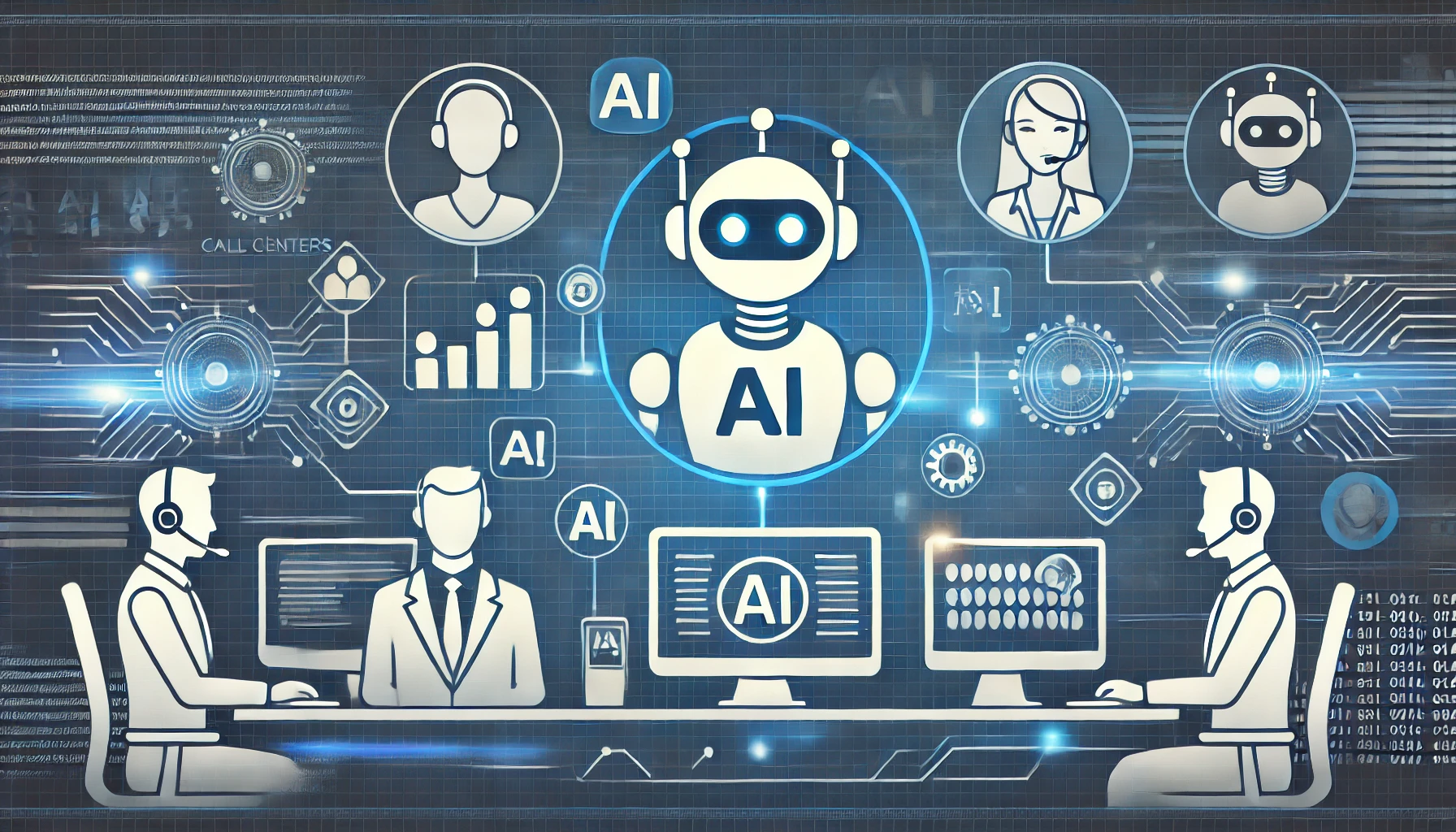Did you know that over 70% of customer interactions could soon be managed by AI? With advancements in artificial intelligence, traditional call centers are undergoing a significant transformation. But does this mean that human agents will become obsolete? Not quite. The reality is that AI is changing the way call centers operate, but it isn’t about replacing humans altogether. Instead, it’s about improving efficiency, speeding up processes, and enhancing the customer experience.
AI call centers are now a part of the business landscape, providing automated solutions for common customer queries. However, they still rely on human agents to manage more complex issues that require empathy and a personal touch. So, how exactly is AI being used, and what does this mean for the future of customer service?
Contents
The Role of AI in Modern Call Centers
AI plays a crucial role in modernizing call centers by automating routine tasks and streamlining customer interactions. It can handle repetitive activities like answering basic queries, scheduling appointments, and providing account information. This automation saves time for human agents, allowing them to focus on more complex tasks that require problem-solving and emotional intelligence.
One of the key benefits of AI in call centers is its ability to process information quickly. AI can access databases, analyze customer data, and provide accurate responses within seconds. This reduces wait times and ensures customers get the information they need without unnecessary delays.
Moreover, AI-powered chatbots and virtual assistants are available 24/7, offering support at any time of the day or night. This constant availability means that businesses can assist their customers whenever they need it, which improves overall satisfaction. However, while AI handles basic tasks efficiently, it lacks the human touch needed for more nuanced interactions. That’s why a balanced approach—combining the speed of AI with the empathy of human agents—creates the best customer service experience.
As businesses continue to adopt AI solutions, the future of call centers is likely to be more integrated and tech-driven. However, the goal is not to replace humans but to enhance their capabilities. This synergy between AI and human agents will define the next generation of customer support.
Benefits of AI Integration
Imagine a call center where customers never have to wait on hold. That’s one of the biggest benefits of AI integration. By using AI to handle routine tasks, businesses can speed up response times and improve the overall customer experience. Whether it’s answering simple questions, guiding users through troubleshooting, or providing account details, AI can handle these tasks quickly and efficiently.
One major advantage is efficiency. AI systems can process information and respond to queries in a fraction of the time it would take a human agent. This means shorter wait times, faster resolutions, and happier customers. Plus, AI can handle multiple requests simultaneously, so there’s no bottleneck when demand spikes.
Another key benefit is cost savings. Running a call center can be expensive, especially if you need to scale up during busy periods. With AI, companies don’t need to worry about hiring and training extra staff to handle peak times. Automated systems can manage a higher volume of inquiries without additional costs, making operations more scalable.
Personalization is also a significant benefit. AI can analyze customer data to deliver tailored responses, offering solutions based on past interactions and preferences. This kind of personalized service makes customers feel valued and understood, which can enhance brand loyalty.
Furthermore, an AI call center operates round-the-clock, providing 24/7 support. Customers don’t have to wait for business hours to get help, which means issues are resolved faster. This constant availability ensures that businesses can maintain a high level of service, no matter when customers reach out.
Limitations of AI in Call Centers
Despite the impressive benefits, AI in call centers has its limitations. The biggest challenge? Lack of empathy. While AI systems can understand keywords and phrases, they cannot truly grasp the emotions behind a customer’s words. When a frustrated or upset customer calls, a human agent can provide empathy, understanding, and reassurance—qualities that AI simply cannot replicate.
Another limitation is that AI may struggle with complex or nuanced issues. Although it’s great at handling routine requests, AI systems can get confused when dealing with complicated problems or unusual situations. When a customer needs a detailed explanation or a personalized solution, a human agent is often more capable of resolving the issue.
Potential errors also pose a risk. While AI can analyze data quickly, it’s not always accurate. A misinterpreted query or incorrect data retrieval could lead to incorrect responses, frustrating customers even more. Businesses need to ensure that their AI systems are constantly monitored and updated to minimize errors.
Lastly, there are privacy concerns. AI systems rely on vast amounts of data to function effectively, but this raises questions about data security. Companies need to be careful about how they handle customer information, ensuring that it is protected against breaches and misuse. Maintaining privacy and gaining customer trust are crucial elements that AI must address to be successful in customer service.
The Future: A Hybrid Approach
Can AI completely replace human agents in call centers? Not quite. The future of customer service lies in a hybrid approach that combines the best of both worlds. While AI can handle routine tasks quickly and efficiently, human agents excel at managing complex issues that require empathy and critical thinking. This collaboration ensures that customers get accurate, fast responses when they need them, along with a personal touch for more sensitive matters.
The AI call center of the future will use technology to take care of repetitive tasks like answering FAQs, processing payments, and guiding users through simple troubleshooting. Meanwhile, human agents will focus on resolving more detailed or emotional concerns, where understanding tone and context is crucial. This division of labor not only improves efficiency but also enhances job satisfaction for agents, who can now concentrate on more rewarding tasks.
Businesses adopting a hybrid approach can scale their operations more easily. When demand spikes, AI can handle the influx of simpler queries without overwhelming the system, leaving agents free to tackle the more challenging interactions. This balanced model promises better service for customers and a more cost-effective operation for companies.
Ethical Considerations
The rise of AI in call centers brings up several ethical concerns that companies cannot afford to ignore. One of the biggest issues is the fear of job loss. As AI becomes more integrated into customer service, many people worry about losing their jobs to machines. It’s essential for businesses to address these fears by focusing on reskilling and training employees. Rather than replacing human workers, AI should be seen as a tool that allows them to work more efficiently and take on new roles within the organization.
Data privacy is another significant concern. AI systems rely on vast amounts of customer information to function effectively, but this raises questions about how data is collected, stored, and used. Customers need to feel confident that their personal information is safe and won’t be misused. Companies must prioritize strong data security measures and transparent practices to maintain trust.
Finally, there’s the issue of bias in AI systems. If not carefully designed, AI can inadvertently reflect the biases present in the data it has been trained on. This can lead to unfair or inaccurate responses that affect the customer experience. To avoid this, businesses must continually test and refine their AI solutions to ensure they are inclusive and unbiased.
Conclusion
The integration of AI into call centers is transforming the way businesses handle customer service. But it’s not just about replacing traditional methods; it’s about creating a smarter, more efficient system that combines the strengths of both AI and human agents. By using a hybrid approach, companies can offer fast, reliable support without losing the personal touch that only humans can provide.
However, as this technology advances, businesses must address the ethical challenges that come with it. Ensuring job security through reskilling, protecting customer privacy, and preventing bias are crucial for building trust and maintaining a positive customer experience. In the end, the future of call centers isn’t about AI versus humans—it’s about how they can work together to deliver the best possible service.



